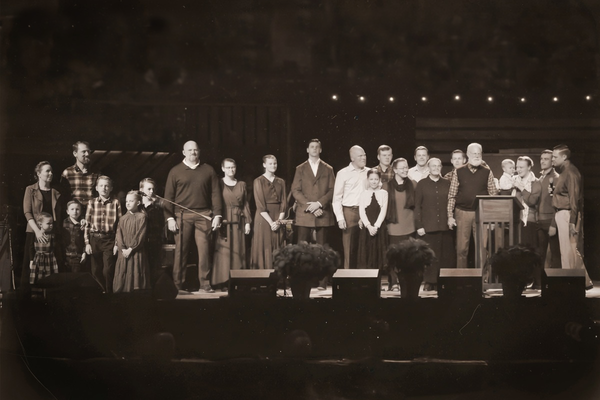The Path of Humility that Leads to Power

Adapted from Sunday’s Message—August 25, 2024
The Reality We Choose
What sets apart those who move from strength to strength in their walk with God from those trapped in hopeless cynicism? The difference isn't in life’s circumstances but in how we perceive and respond to even the smallest visitations of His grace. Those who bear the fruit we long for, those who walk in strength and joy, see God's Word and presence as the ultimate reality. They don’t dismiss it with a casual, "I tried that, and it didn’t work." No, they declare, "Let God be true, and every man a liar" (Rom. 3:4), and look inward, saying, "I must not have done it right."
This is the crux of our spiritual journey: What is our reality? Is it God and His presence, or is it ourselves? If we each appoint ourselves as the judge of God's presence, measuring His Word by our own standards, we have made ourselves God. True faith—the kind that grows and flourishes—begins where our self-sufficiency ends. It begins when we reach the end of our own resources and recognize that God is sovereign and faithful.
Letting Go of the Past
Surrendering to God’s sovereignty is not an abstract principle; it’s the bedrock of a transformed life. As the Lord declares in Isaiah:
"Do not call to mind the former things, or ponder things of the past. Behold, I will do something new; now it will spring forth; will you not be aware of it?" (Isa. 43:18-19).
God calls us to stop dwelling on what was and to prepare ourselves for the unprecedented. Our instinct is to cling to the familiar, even when it becomes a chain binding us from the answers we seek. "Do not call to mind the former things"—because doing so blinds us to the fresh movement of His Spirit. Past patterns do not bind his ways; His thoughts are far beyond ours (Isa. 55:9).
Preconceptions predispose us to miss out on miracles. Consider how often we approach Scripture with preconceived notions, expecting it to say something it does not. We read a familiar passage, convinced there is an error, only to realize later that the mistake was ours. Similarly, we might struggle with a new translation of the Bible—not because it’s inferior, but because it doesn’t fit the well-worn grooves in our minds.
But these technicalities are metaphors for the frameworks of unbelief that we embrace. These frameworks must be abandoned as we forsake the former things and open our hearts to the new things God is doing whenever His Presence is moving upon us.
The Power of Humility and Obedience
Humility—trusting God's Word above our fears and mental appraisals—is the gateway to divine power. Jesus, entrusted with all the Father’s power, never once diverted it to Himself. He understood the direct connection between our submission and the power God entrusts to us. Pride and humility are ultimately a question of reality. Even fear can be an expression of pride when it flows from the preconceptions and appraisals of our own minds in conflict with the immutable Word of God's power.
Have you ever wondered why we saw more miracles when we first came to God? The answer is simple: we were more humble then. We disallowed the critical mind of the flesh. Like Naaman, we were willing to do whatever God asked, no matter how small. If we can return to that humility, we will see the same grace and power flow through our lives once more. Humility and brokenness are not signs of defeat; they are the very means by which God’s power is perfected in us (2 Cor. 12:9). When our trust shifts from self to God, we enter into genuine faith—the victory that overcomes the world (1 John 5:4).
The Power of Words and Commitment
We must also recognize the immense power of our words in shaping reality. Words, like seeds, grow into what they are intended to produce. When we confess God’s truth, we align ourselves with His will, and our lives begin to reflect that destiny. But when we speak words of doubt, fear, or negativity, we cultivate a reality that contradicts God’s promises. Jesus said, "By your words you will be justified, and by your words you will be condemned" (Matt. 12:37).
Consider how a seemingly small, careless comment can shape the trajectory of a day—or even a life. The words you choose to repeat, you will come to believe, and your uttered beliefs become the roadmap to your destiny. Our words carry the power of life and death.
A study on forming new habits revealed the profound impact of a simple declaration. Participants who made a commitment to daily exercise were divided into groups. The first group was informed of the benefits of exercise and left to their own devices. The second group received the same information but was also provided with a motivational video. The third group, however, not only received information but also made a public declaration of their intent to exercise.
Those who merely heard the benefits had a success rate of 35%. Those who heard the benefits and received motivation saw little improvement. But those who made a public commitment? A staggering 75% followed through.
"And they overcame him by the blood of the Lamb, and by the word of their testimony; and they loved not their lives unto death." (Rev. 12:11)
Embracing Humility and Grace
Here is an irony—nothing frustrates the fruitless as much as delay. They imagine they are waiting on God, restless in His “waiting room,” but He is waiting on them—delaying judgment and giving them a chance to humble themselves, believe His word, and be transformed.
God, in His mercy, has given us time—time to repent, humble ourselves, and declare, “You are God; I am not” (Ps. 51:17). He has given us new mercies every morning. The angels, who exist outside of time, marvel at this gift, longing to look into this redemptive grace, for they have no second chances, no opportunity for redemption. But we, with each passing day, are granted the grace to surrender anew, to humble ourselves, and to let God's grace flow through us. "The Lord is not slow to fulfill His promise, as some count slowness, but is patient toward you, not wishing that any should perish, but that all should reach repentance" (2 Pet. 3:9). This divine patience, this delay in judgment, is the "kindness" of God—His extended mercy—that leads us to repentance (Rom. 2:4).
When we judge others or elevate ourselves by pushing someone else down, we close ourselves off to the grace that God longs to pour out, upon, and through us. We must search our hearts, remove every trace of pride, and embrace the humility that Jesus lived out. The moment we elevate ourselves above His Word or dismiss His promises as inadequate, we usurp the throne and impede the flow of His grace.
Conclusion
Ultimately, the victory that conquers the world is not wrought through grand gestures or the force of our will but through the humble, unwavering confession of faith in the One who holds all things in His hands. We overcome not by our strength but by the blood of the Lamb and the power of our testimony. True freedom and power are found in the daily surrender of our pride and the relentless realignment of our hearts with God’s anointed Word. Let us, then, cast off every hindrance, every shred of self-reliance, and run with unyielding endurance the race marked out for us, fixing our eyes on Jesus, the author and perfecter of our faith.
Listen to the full message here.





